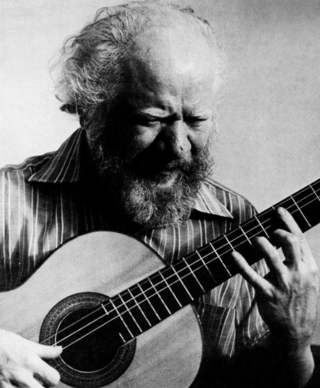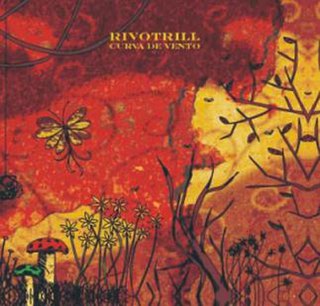
Hermeto Pascoal is a Brazilian composer and multi-instrumentalist. He was born in Lagoa da Canoa, Alagoas, Brazil. Pascoal is best known in Brazilian music for his orchestration and improvisation, as well as for being a record producer and contributor to many Brazilian and international albums.

Frevo is a dance and musical style originating from Recife, Pernambuco, Brazil, traditionally associated with Brazilian Carnival. The word frevo is said to come from frever, a variant of the Portuguese word ferver. It is said that the sound of the frevo will make listeners and dancers feel as if they are boiling on the ground. The word frevo is used for both the frevo music and the frevo dance.

The 6th Annual Latin Grammy Awards were held in Los Angeles at the Shrine Auditorium on Thursday, November 3, 2005. It was the first ceremony to be broadcast by Univision in the United States. Ivan Lins was the big winner, winning two awards, including Album of the Year. He is the first and only Brazilian and Portuguese-language artist to win Album of the Year to date. Alejandro Sanz was honored with Record of the Year and Song of the Year. Juanes won three awards including Best Rock Solo Vocal Album.

Severino Dias de Oliveira, known professionally as Sivuca, was a Brazilian accordionist, guitarist and singer. In addition to his home state of Paraíba, Brazil, and cities Recife and Rio de Janeiro, he worked and lived in Paris, Lisbon, and New York City intermittently. He has two daughters, Wilma Da Silva and Flavia de Oliveira Barreto.

Alceu Valença is a Brazilian singer, musician, and songwriter.

Zé Ramalho is a Brazilian composer and performer. Zé Ramalho has collaborated with various major Brazilian musicians, including Vanusa, Geraldo Azevedo and Alceu Valença.

Raimundo Fagner Cândido Lopes is a Brazilian singer, composer, musician, actor and music producer. He is commonly known by the stage name of Fagner.

Antologia Acústica is an acoustic compilation album by Brazilian solo artist Zé Ramalho. It was released in 1997, same year in which he released a 3-CD box set to celebrate 20 years of career. It went double-platinum and triple-platinum in 2005, with more than 750.000 copies sold.
Carlos Roberto Cavalcanti de Albuquerque, known as Robertinho do Recife, is a Brazilian guitarist, record producer, composer born in the city of Recife, Brazil. His first contact with the guitar was at the age of 10. After he was run over by a car, he had to stay long periods of time at home and had to watch a lot of TV. In one of these TV programs he met the Beatles and fell in love with the guitar. He got his first guitar as a gift from his grandfather. At the age of 12 he was already playing with bands in Recife. He had very good technique and later was invited to play with bands like: Watch Pocket, Chicago and Quiet Riot. He played a little of everything: from music for children, to heavy metal and neoclassical. At the end of the 1980s he played with the Brazilian band Yahoo, when they played a cover of "Love Bites", a song from the British band Def Leppard. He is currently working as a music producer in his own studio in Rio de Janeiro.

Maria Rosa Canelas, better known as Rosinha de Valença, was a Brazilian composer, arranger and musician. She is considered one of the best acoustic guitarists in Brazilian music and played with many famous artists, including Baden Powell, Sérgio Mendes, Sylvia Telles and Sivuca.

Curva de vento is the debut album of the Brazilian instrumental band Rivotrill. Released in 2008, all the album was recorded inside a house in Itamaracá, Pernambuco, and counted on the participation of other artists, such as Naná Vasconcelos and Maestro Spok. The songs of the album mix Brazilian, Caribbean and African rhythms, progressive rock and jazz.

José Domingos de Morais, better known as Dominguinhos, was a Brazilian composer, accordionist and singer. His principal musical influences were the music of Luiz Gonzaga, Forró and in general the music of the Sertão in the Brazilian Northeast. He further developed this typical Brazilian musical style, born out of the European, African and Indian influences in north-eastern Brazil, creating a unique style of Brazilian Popular Music.

Antonio Nóbrega is a Brazilian singer, dancer and actor whose work features cultural traditions from Pernambuco.

Passo de anjo is the debut album of the Brazilian big band SpokFrevo Orquestra. Released in 2004, the album was praised for its innovation of frevo, which presents some influences from jazz, emphasizing improvisations. The album was firstly released independently. However, two years later, due to its success, it was released again by Biscoito Fino.
Comadre Florzinha, also known as Comadre Fulorzinha or Comadre Fulozinha, is a Brazilian group formed by Karina Buhr, Mairah Rocha, Flávia Maia, Marcelo Monteiro and Letícia Coura. The band was created in Recife, Pernambuco and became famous for recording several rhythms of that region and contributing to spreading the culture of that state.
Fred Andrade is a Brazilian musician and composer. Active in Recife, Pernambuco, Brazil, he has played with Elba Ramalho, Quinteto Violado, Heraldo do Monte, Naná Vasconcelos, Lula Queiroga, Dominguinhos, and Lenine. He was also member of the instrumental groups Mandinga and Noise Viola.

Lisbela e o Prisioneiro is a 2003 Brazilian romantic comedy film directed by Guel Arraes, based on the 1964 play of the same name by Osman Lins.
Edwin Barbosa, also known as Edwin de Olinda, was a Brazilian percussionist for Alceu Valença.

Ave Sangria is a Brazilian rock band and one of the leading names of the 1970s psychedelic music scene of Pernambuco, along with Alceu Valença, Flaviola e O Bando do Sol, Lula Côrtes, Marconi Notaro and Lailson.















